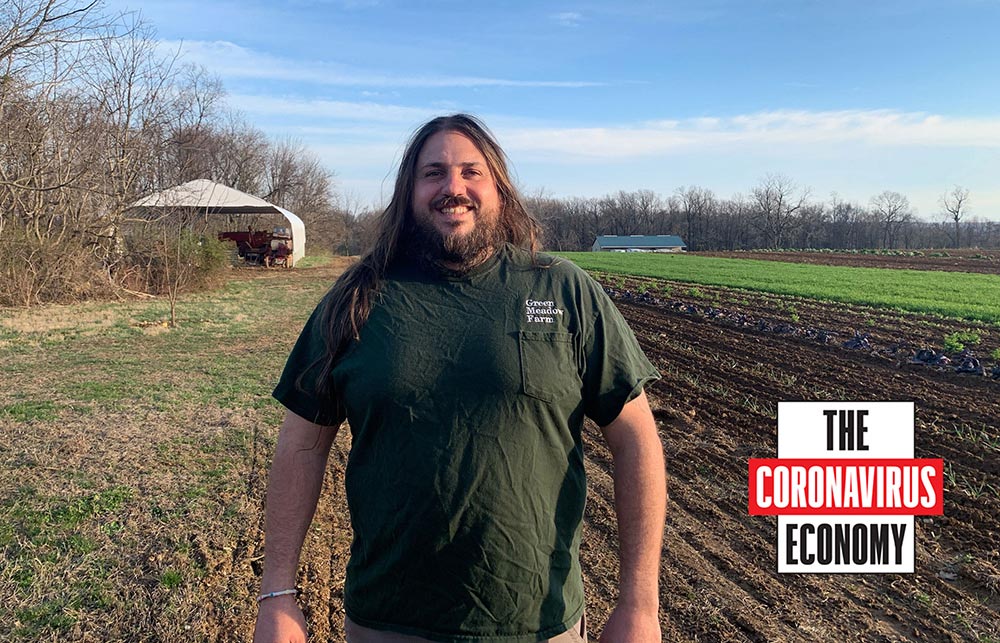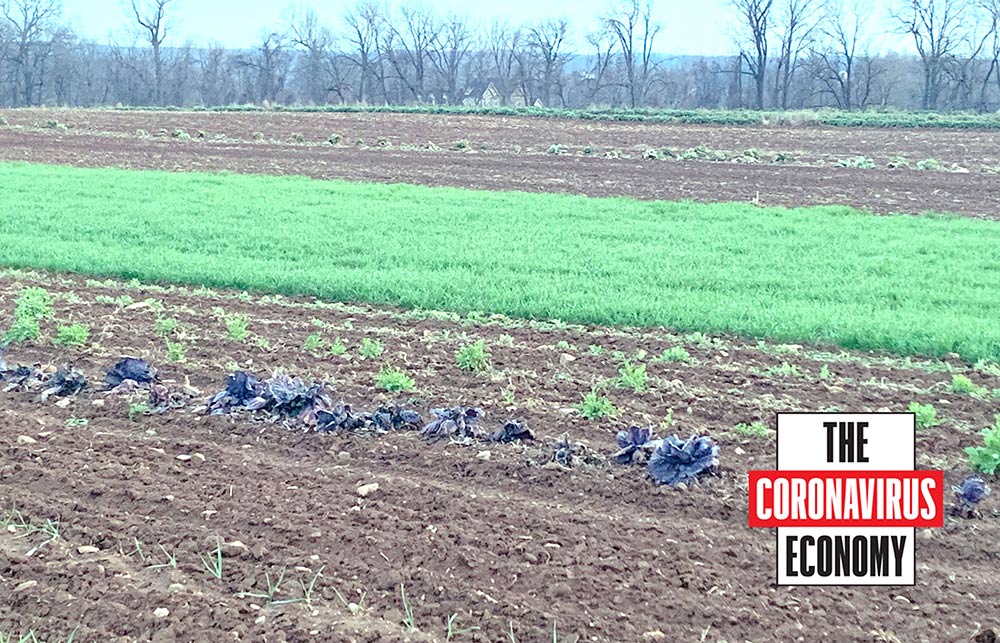伊恩·布倫德家務(wù)農(nóng)的歷史,,可以追溯到他父親那一脈六代以前,。布倫德家的可持續(xù)農(nóng)場(chǎng)“綠草地”占地22英畝,,位于美國(guó)賓夕法尼亞州中南部的蘭卡斯特縣——一個(gè)擁有全美最高產(chǎn)的無(wú)灌溉農(nóng)田的縣城。布倫德說(shuō):“蘭卡斯特縣五分之一的工作都和農(nóng)業(yè)有關(guān),。”
從漢密爾頓主持修建獨(dú)立廳的日子算起,,該縣就成了費(fèi)城真正意義上的生命線,;而位于城鎮(zhèn)和鄉(xiāng)村之間的蘭開(kāi)斯特大道,,綿延60英里,,是為了方便農(nóng)民送貨而建,。布倫德延續(xù)了這一傳統(tǒng),每周四開(kāi)著卡車(chē)(冬季兩輛,,旺季最多四輛)給120位主廚的餐廳送貨。但最近,,這些客戶(hù)的餐廳幾乎都因新冠病毒的蔓延而暫時(shí)關(guān)閉了,。
《財(cái)富》雜志對(duì)布倫德進(jìn)行了采訪,,詢(xún)問(wèn)冠狀病毒對(duì)其用工情況和未來(lái)計(jì)劃的影響,也了解了他如何消化冠狀病毒帶來(lái)的情緒和財(cái)務(wù)上的壓力,。
以下采訪內(nèi)容經(jīng)過(guò)精簡(jiǎn)及少量編輯。

《財(cái)富》:綠草地是如何起步的?
布倫德:我父親家本來(lái)是務(wù)農(nóng)的,,后來(lái)他上了大學(xué),畢業(yè)后在工程行業(yè)工作,,但他一直有一個(gè)半英畝的花園。有一天,,他發(fā)現(xiàn)農(nóng)業(yè)才是他真正想做的事業(yè),。70年代末80年代初,,他把阿米什人帶去雷丁車(chē)站市場(chǎng),后來(lái)他問(wèn)能不能從他的花園里帶一些東西來(lái)賣(mài),。那差不多算是我們農(nóng)場(chǎng)的起源,。廚師們來(lái)到市場(chǎng),,從他那里買(mǎi)些東西餐館的原材料,再后來(lái)他買(mǎi)了輛二手小貨車(chē),,裝一個(gè)箱子,,開(kāi)始往城里送東西,。
那時(shí)人們對(duì)當(dāng)?shù)乜沙掷m(xù)種植的農(nóng)產(chǎn)品興趣大嗎?
剛起步時(shí),,想要把同樣能在農(nóng)產(chǎn)品區(qū)買(mǎi)到東西賣(mài)到兩倍的價(jià)格,真的是一件很難的事情,。你需要跟他們解釋?zhuān)骸斑@是我昨天才摘的,,也就是說(shuō)昨天剛從地里挖出來(lái)的。如果你好好儲(chǔ)存,,能放上兩禮拜,,不像那些從外地運(yùn)來(lái)的東西,你收到的時(shí)候可能已經(jīng)從地里摘出來(lái)一兩個(gè)禮拜了,。”這是我父親早期向人推銷(xiāo)的賣(mài)點(diǎn),,后來(lái)我們?cè)诖嘶A(chǔ)上逐步發(fā)展,。
農(nóng)場(chǎng)是從什么時(shí)候開(kāi)始真正發(fā)展起來(lái)?
大概在21世紀(jì)初,,我決定以經(jīng)營(yíng)農(nóng)場(chǎng)為生。雖然在此之前,,批發(fā)業(yè)務(wù)就已經(jīng)存在了,。但真正爆炸式發(fā)展,真的有越來(lái)越多的人關(guān)注食物的來(lái)源是在21世紀(jì)初,。我們每周都會(huì)將訂貨表通過(guò)電子郵箱發(fā)給大約650個(gè)人,其中約有120個(gè)人一整年都會(huì)下單,。在淡季,,比如假期剛過(guò)那段時(shí)間,每天可能只有35到40個(gè)訂單,。但在夏末秋初的旺季,,每天最多能送75單,。
大西洋中部正在步入春天,果樹(shù)開(kāi)了花,,坡道上五顏六色,。農(nóng)場(chǎng)里的氣氛怎么樣?
當(dāng)前的不確定性,,使我們無(wú)法在春季全力以赴,,這必然造成了很大阻礙。事發(fā)前一周,,我們還送了53單。那些提供外賣(mài)的餐館仍在下訂單,。差不多是平常業(yè)務(wù)量的10%,。我們還用餐館里回收的油為溫室供能,,現(xiàn)在也弄不到了。現(xiàn)有儲(chǔ)備還夠用一個(gè)季度,,但如果不能為冬天做足儲(chǔ)備,,就將損失一大筆錢(qián),。
像綠草地這樣的小型家庭農(nóng)場(chǎng)經(jīng)濟(jì)上會(huì)受到什么影響?
哪怕經(jīng)濟(jì)景氣時(shí),靠種地賺錢(qián)也是很困難的。為什么農(nóng)民和廚師能和諧相處,?至少在我看來(lái),全國(guó)農(nóng)民和廚師整體上相處地非常和諧,。這或許因?yàn)椋覀儼褤碛械囊磺?,無(wú)論是經(jīng)濟(jì)還是精神上的一切,都投入到了農(nóng)場(chǎng)和餐館中,。但得到的經(jīng)濟(jì)回報(bào)卻少得可憐,。我真覺(jué)得,美國(guó)政府被打了個(gè)措手不及,。如果說(shuō)有什么事能讓大家認(rèn)識(shí)到,,事情真的需要發(fā)生改變,就是當(dāng)前正在發(fā)生的了,。
這是當(dāng)?shù)剞r(nóng)民的普遍看法嗎?
除了農(nóng)場(chǎng)種地的農(nóng)民,我很少和本地其他農(nóng)民交流,。我爸爸,、我還有我們的工作人員,,我們不是蘭卡斯特縣農(nóng)業(yè)的典型代表。

綠草地的主要客戶(hù)是餐廳,,眼下你要如何調(diào)整農(nóng)場(chǎng)業(yè)務(wù)?
當(dāng)一切都在走下坡路時(shí),我的得力助手戴夫·卡爾說(shuō):“伙計(jì),,我們做個(gè)面向普通消費(fèi)者的產(chǎn)品盒子吧,。”我知道,,做農(nóng)場(chǎng)共享,、農(nóng)場(chǎng)盒子或社區(qū)支持農(nóng)業(yè)都不是什么新鮮事,但對(duì)我們來(lái)說(shuō)卻是全新的,,真的就像離開(kāi)了水的魚(yú)。我們目前在做30美元的單盒和55美元的雙盒,,還有肉類(lèi)和奶制品盒子,,在費(fèi)城城內(nèi)及周邊有四個(gè)取貨點(diǎn),。
農(nóng)場(chǎng)盒子里一般都有什么?
現(xiàn)在,每個(gè)人的免疫系統(tǒng)都比任何時(shí)候更需要增強(qiáng),,所以我們會(huì)把農(nóng)場(chǎng)種植的天然抗病毒或者對(duì)人體免疫系統(tǒng)非常有益的食材放進(jìn)盒子。例如,,本周我們會(huì)配送圣羅勒和茼蒿,這是一種日本菊科植物,,在亞洲有些地方當(dāng)作補(bǔ)品,。還有蜂蜜,、蘑菇,、西洋菜苔,都非常有營(yíng)養(yǎng),,味道也很好。
農(nóng)場(chǎng)盒子能維持農(nóng)場(chǎng)這段時(shí)間的運(yùn)營(yíng)嗎,?
目前為止,我們已經(jīng)有60個(gè)注冊(cè)用戶(hù),,且有望達(dá)到100個(gè),。但說(shuō)實(shí)話,,我現(xiàn)在根本沒(méi)有考慮自己。我想的是我們的屠夫,,他有抵押貸款和賬單要付,,還有15到20個(gè)農(nóng)民為我們種地。我有一個(gè)雞蛋供應(yīng)商約翰·B·金,,去年為我擴(kuò)增了養(yǎng)殖量?,F(xiàn)在雞開(kāi)始下蛋,而他必須要給那些雞蛋找到出路,。我們需要維持下去,,這樣才不會(huì)輸?shù)靡粩⊥康兀覀円脖仨毐M可能幫助一路上同行的人,。
你的日常工作都是在自然環(huán)境中,,會(huì)不會(huì)因此對(duì)現(xiàn)在的情況有些不同的理解?
我想任何在自然中或戶(hù)外工作的人都會(huì)說(shuō),會(huì)的。在這個(gè)時(shí)刻,,我們需要反思,,意識(shí)到自己太理所當(dāng)然地看待一切了。這是我們歷史上的重要時(shí)刻,,需要回顧過(guò)去,,作出反思:“伙計(jì),在此之前,,我們太把一切都當(dāng)成是理所當(dāng)然的了,。”希望我們能有所改變,。
未來(lái)有什么種植計(jì)劃?
我們還是要做本該做的事,。可能會(huì)在玉米和谷物上多花點(diǎn)精力,,但仍然在種西紅柿,、辣椒。將要應(yīng)對(duì)的只是7月能不能賣(mài)出18箱辣椒這種不確定性,。但我們還是會(huì)繼續(xù)耕種,。只要還能繼續(xù),我們就會(huì)繼續(xù)干下去,。(財(cái)富新聞網(wǎng))
譯者:Agatha
伊恩·布倫德家務(wù)農(nóng)的歷史,可以追溯到他父親那一脈六代以前,。布倫德家的可持續(xù)農(nóng)場(chǎng)“綠草地”占地22英畝,,位于美國(guó)賓夕法尼亞州中南部的蘭卡斯特縣——一個(gè)擁有全美最高產(chǎn)的無(wú)灌溉農(nóng)田的縣城,。布倫德說(shuō):“蘭卡斯特縣五分之一的工作都和農(nóng)業(yè)有關(guān)?!?/p>
從漢密爾頓主持修建獨(dú)立廳的日子算起,該縣就成了費(fèi)城真正意義上的生命線,;而位于城鎮(zhèn)和鄉(xiāng)村之間的蘭開(kāi)斯特大道,,綿延60英里,是為了方便農(nóng)民送貨而建,。布倫德延續(xù)了這一傳統(tǒng),每周四開(kāi)著卡車(chē)(冬季兩輛,,旺季最多四輛)給120位主廚的餐廳送貨,。但最近,,這些客戶(hù)的餐廳幾乎都因新冠病毒的蔓延而暫時(shí)關(guān)閉了,。
《財(cái)富》雜志對(duì)布倫德進(jìn)行了采訪,詢(xún)問(wèn)冠狀病毒對(duì)其用工情況和未來(lái)計(jì)劃的影響,,也了解了他如何消化冠狀病毒帶來(lái)的情緒和財(cái)務(wù)上的壓力。
以下采訪內(nèi)容經(jīng)過(guò)精簡(jiǎn)及少量編輯,。
《財(cái)富》:綠草地是如何起步的?
布倫德:我父親家本來(lái)是務(wù)農(nóng)的,后來(lái)他上了大學(xué),,畢業(yè)后在工程行業(yè)工作,,但他一直有一個(gè)半英畝的花園。有一天,,他發(fā)現(xiàn)農(nóng)業(yè)才是他真正想做的事業(yè),。70年代末80年代初,他把阿米什人帶去雷丁車(chē)站市場(chǎng),,后來(lái)他問(wèn)能不能從他的花園里帶一些東西來(lái)賣(mài)。那差不多算是我們農(nóng)場(chǎng)的起源,。廚師們來(lái)到市場(chǎng),,從他那里買(mǎi)些東西餐館的原材料,再后來(lái)他買(mǎi)了輛二手小貨車(chē),,裝一個(gè)箱子,開(kāi)始往城里送東西,。
那時(shí)人們對(duì)當(dāng)?shù)乜沙掷m(xù)種植的農(nóng)產(chǎn)品興趣大嗎?
剛起步時(shí),想要把同樣能在農(nóng)產(chǎn)品區(qū)買(mǎi)到東西賣(mài)到兩倍的價(jià)格,,真的是一件很難的事情,。你需要跟他們解釋?zhuān)骸斑@是我昨天才摘的,也就是說(shuō)昨天剛從地里挖出來(lái)的,。如果你好好儲(chǔ)存,,能放上兩禮拜,不像那些從外地運(yùn)來(lái)的東西,,你收到的時(shí)候可能已經(jīng)從地里摘出來(lái)一兩個(gè)禮拜了,。”這是我父親早期向人推銷(xiāo)的賣(mài)點(diǎn),,后來(lái)我們?cè)诖嘶A(chǔ)上逐步發(fā)展,。
農(nóng)場(chǎng)是從什么時(shí)候開(kāi)始真正發(fā)展起來(lái)?
大概在21世紀(jì)初,,我決定以經(jīng)營(yíng)農(nóng)場(chǎng)為生,。雖然在此之前,,批發(fā)業(yè)務(wù)就已經(jīng)存在了,。但真正爆炸式發(fā)展,真的有越來(lái)越多的人關(guān)注食物的來(lái)源是在21世紀(jì)初,。我們每周都會(huì)將訂貨表通過(guò)電子郵箱發(fā)給大約650個(gè)人,,其中約有120個(gè)人一整年都會(huì)下單,。在淡季,,比如假期剛過(guò)那段時(shí)間,每天可能只有35到40個(gè)訂單,。但在夏末秋初的旺季,,每天最多能送75單。
大西洋中部正在步入春天,,果樹(shù)開(kāi)了花,,坡道上五顏六色。農(nóng)場(chǎng)里的氣氛怎么樣?
當(dāng)前的不確定性,,使我們無(wú)法在春季全力以赴,,這必然造成了很大阻礙。事發(fā)前一周,,我們還送了53單,。那些提供外賣(mài)的餐館仍在下訂單。差不多是平常業(yè)務(wù)量的10%,。我們還用餐館里回收的油為溫室供能,,現(xiàn)在也弄不到了。現(xiàn)有儲(chǔ)備還夠用一個(gè)季度,,但如果不能為冬天做足儲(chǔ)備,,就將損失一大筆錢(qián)。
像綠草地這樣的小型家庭農(nóng)場(chǎng)經(jīng)濟(jì)上會(huì)受到什么影響?
哪怕經(jīng)濟(jì)景氣時(shí),,靠種地賺錢(qián)也是很困難的,。為什么農(nóng)民和廚師能和諧相處?至少在我看來(lái),,全國(guó)農(nóng)民和廚師整體上相處地非常和諧。這或許因?yàn)?,我們把擁有的一切,,無(wú)論是經(jīng)濟(jì)還是精神上的一切,,都投入到了農(nóng)場(chǎng)和餐館中。但得到的經(jīng)濟(jì)回報(bào)卻少得可憐,。我真覺(jué)得,,美國(guó)政府被打了個(gè)措手不及。如果說(shuō)有什么事能讓大家認(rèn)識(shí)到,,事情真的需要發(fā)生改變,,就是當(dāng)前正在發(fā)生的了。
這是當(dāng)?shù)剞r(nóng)民的普遍看法嗎?
除了農(nóng)場(chǎng)種地的農(nóng)民,,我很少和本地其他農(nóng)民交流,。我爸爸、我還有我們的工作人員,,我們不是蘭卡斯特縣農(nóng)業(yè)的典型代表,。
綠草地的主要客戶(hù)是餐廳,眼下你要如何調(diào)整農(nóng)場(chǎng)業(yè)務(wù)?
當(dāng)一切都在走下坡路時(shí),,我的得力助手戴夫·卡爾說(shuō):“伙計(jì),,我們做個(gè)面向普通消費(fèi)者的產(chǎn)品盒子吧?!蔽抑?,做農(nóng)場(chǎng)共享,、農(nóng)場(chǎng)盒子或社區(qū)支持農(nóng)業(yè)都不是什么新鮮事,,但對(duì)我們來(lái)說(shuō)卻是全新的,,真的就像離開(kāi)了水的魚(yú)。我們目前在做30美元的單盒和55美元的雙盒,,還有肉類(lèi)和奶制品盒子,,在費(fèi)城城內(nèi)及周邊有四個(gè)取貨點(diǎn)。
農(nóng)場(chǎng)盒子里一般都有什么?
現(xiàn)在,,每個(gè)人的免疫系統(tǒng)都比任何時(shí)候更需要增強(qiáng),,所以我們會(huì)把農(nóng)場(chǎng)種植的天然抗病毒或者對(duì)人體免疫系統(tǒng)非常有益的食材放進(jìn)盒子。例如,,本周我們會(huì)配送圣羅勒和茼蒿,,這是一種日本菊科植物,在亞洲有些地方當(dāng)作補(bǔ)品,。還有蜂蜜,、蘑菇、西洋菜苔,,都非常有營(yíng)養(yǎng),,味道也很好,。
農(nóng)場(chǎng)盒子能維持農(nóng)場(chǎng)這段時(shí)間的運(yùn)營(yíng)嗎?
目前為止,,我們已經(jīng)有60個(gè)注冊(cè)用戶(hù),,且有望達(dá)到100個(gè)。但說(shuō)實(shí)話,,我現(xiàn)在根本沒(méi)有考慮自己,。我想的是我們的屠夫,他有抵押貸款和賬單要付,,還有15到20個(gè)農(nóng)民為我們種地,。我有一個(gè)雞蛋供應(yīng)商約翰·B·金,去年為我擴(kuò)增了養(yǎng)殖量?,F(xiàn)在雞開(kāi)始下蛋,,而他必須要給那些雞蛋找到出路。我們需要維持下去,,這樣才不會(huì)輸?shù)靡粩⊥康?,但我們也必須盡可能幫助一路上同行的人。
你的日常工作都是在自然環(huán)境中,,會(huì)不會(huì)因此對(duì)現(xiàn)在的情況有些不同的理解?
我想任何在自然中或戶(hù)外工作的人都會(huì)說(shuō),,會(huì)的。在這個(gè)時(shí)刻,,我們需要反思,,意識(shí)到自己太理所當(dāng)然地看待一切了。這是我們歷史上的重要時(shí)刻,,需要回顧過(guò)去,,作出反思:“伙計(jì),在此之前,,我們太把一切都當(dāng)成是理所當(dāng)然的了,。”希望我們能有所改變,。
未來(lái)有什么種植計(jì)劃?
我們還是要做本該做的事,。可能會(huì)在玉米和谷物上多花點(diǎn)精力,,但仍然在種西紅柿,、辣椒。將要應(yīng)對(duì)的只是7月能不能賣(mài)出18箱辣椒這種不確定性,。但我們還是會(huì)繼續(xù)耕種,。只要還能繼續(xù),我們就會(huì)繼續(xù)干下去,。(財(cái)富新聞網(wǎng))
譯者:Agatha
On his father Glenn’s side, Ian Brendle’s family goes back six generations in agriculture. The Brendles’ sustainability-focused farm, Green Meadow, spreads out across 22 acres of Lancaster County, the south-central Pennsylvania district boasting the most productive nonirrigated farmland in the U.S. “One in every five jobs in Lancaster County is ag-based,” Brendle says.
The county has been a literal lifeline for Philadelphia from the days Hamilton hung around Independence Hall; Lancaster Avenue, stretching 60 miles between town and country, was established so farmers could deliver their goods. Brendle continues in that tradition, running delivery trucks (two in the winter, up to four in the high growing seasons) every Thursday from Green Meadow to 120 chef clients—nearly all of whose restaurants have been temporarily closed by the coronavirus pandemic.
Fortune spoke with Brendle for a new series, The Coronavirus Economy, to ask about how COVID-19 has affected his employment status and his plans for the future, and to get a sense of how he is handling this news both emotionally and financially.
The following interview has been condensed and lightly edited.
Fortune: How did Green Meadow get started?
Brendle: My dad was born into farming, then went to college and worked in engineering, but he always kept a half-acre garden. One day he decided farming was what he wanted to do. He started by taking Amish guys down to Reading Terminal Market back in the late ’70s, early ’80s, then he asked if he could bring a few items from his garden to sell. It just sort of grew from there. Chefs would come in and buy stuff from him to use at the restaurants, and eventually he took an old pickup truck, threw a box on it, and started taking stuff into the city.
Was there much interest in local, sustainably grown produce back then?
When my dad first started, it was really a tough sales pitch to try to charge twice the amount of money for the same type of thing [chefs] would buy down at the produce junction. It took explaining, “Well, hey, I just picked this yesterday. So it’s only been out of the ground since yesterday. If you take care of it, you’ve got two weeks until you have to use it as opposed to something that’s shipped in that could have been picked 10 or 14 days before the time that you receive it.” So that was really the selling point that he drove home early on, then just kind of built on that.
When did things really take off for the farm?
The wholesale business was already in place before I decided to make [farming] my livelihood around the early 2000s. That’s when you could say it really exploded, and I saw more and more people really, really being into where the food came from. Our weekly order list goes out to about 650 individual email addresses, and about 120 order consistently through the year. At slow times, like right after the holidays, we might only have 35 or 40 deliveries. Then at the height, late summer into early fall, we’re looking at up to 75 deliveries to make in one day.
The mid-Atlantic is on the precipice of spring—fruit trees are flowering, ramps are popping. What’s the mood like on the farm?
Dealing with the uncertainty, not being able to just go 100% full bore into spring season has definitely been a real kick in the ass. The week before everything went down, we made 53 deliveries. The restaurants that are doing takeout and delivery are still ordering. I would say that represents 10% of our typical business. We also use recycled fryer oil from restaurants to power our greenhouses, and that’s not available now. We have enough for the rest of this season, but if we don’t have a stockpile built up for winter, we’re missing out huge.
What’s the economic impact of that for a small family farm like Green Meadow?
In good times, it’s incredibly hard to make money farming. I think one of the reasons why farmers and chefs get along so well—and I think, as a whole throughout the country, farmers and chefs get along really well—you pour everything you have into [a farm or a restaurant] both financially and psychologically, and you get very little financial return. I really feel like the U.S. government was caught with its pants down. If there was ever a more glaring notification to everyone that things truly need to change in this country, this is it.
Is that a common sentiment among the farmers in your area?
Besides the people who grow stuff for us, I don’t really talk to other farmers in my area. My dad and I and our crew here, we are not the norm in agriculture in Lancaster County.
With chefs as Green Meadow’s primary customers, how are you adapting the farm’s business?
So basically, as everything was going down, my right-hand man, Dave Carr, he was like, “Dude, let’s just do a produce box for the public.” I know doing a farm share or farm box or CSA is nothing new, but it’s totally new to us—fish out of the water for real. We’re doing a $30 single farm box and a $55 double farm box, as well as meat and dairy boxes, and have four pickup locations in and around Philly.
What’s in a typical farm box?
Right now, more than ever, everyone’s immune system needs to be as boosted as possible, so we’re going to be putting in things we grow that are naturally antiviral or really good for your immune system. This week, for example, we’ll have holy basil and shungiku, which is a Japanese chrysanthemum and used in parts of Asia as a cold tonic. Honey. Mushrooms. All the rabes, which are incredibly nutritious and taste good, too.
Do you think the boxes will help carry the farm during this time?
We have about 60 sign-ups so far and are hoping to get to about 100, but honestly I’m not even thinking about ourselves right now. I’m thinking about our butcher, who’s got a mortgage and bills to pay, and our network of 15 to 20 farmers who also grow for us. I’ve got an egg guy, John B. King, who increased his flock for me last year. This is when chickens start to go into cruise control, and he’s got to move those eggs. We need to stay afloat so that we don’t lose our ass, but we also have to help as many other people along the way as we can.
Does working so closely with nature on the day to day give you a different perspective on the situation?
I think anyone that works in the elements or works outside would say it does. I think this is a time where we’re able to reflect and realize we all take things for granted. This is that time in our history where we’re going to look back and be like, “Man, up until that point we took so much for granted.” And hopefully we change.
What does the planting plan look like moving forward?
We’re still going to do all the same shit that we were going to do. We might dip a little bit more into the acreage for corn and grain, but we’re still putting tomatoes out, still putting peppers out. I just need to deal with the unknown of whether I am going to be able to sell 18 boxes of peppers in July. But we’ll keep farming our ground. We’ll keep going till the wheels fall off, man.






